To accompany your Come Follow Me study for January 20-26
In addition to reading JS-History 1:27-65 and D&C 2 this week, you may want to read the following commentary:
- Chapter 1: Introduction to the Doctrine and Covenants; Doctrine and Covenants 2 (churchofjesuschrist.org)
- An Angel and a Promise (churchofjesuschrist.org)
You may also enjoy the following videos:
If you would like to have a Kahoot game related to this material that you can use with your family or with a class, click here: https://create.kahoot.it/share/joseph-smith-history-1-27-65-and-d-c-2/d5fbd545-65b5-44f9-b940-83eeb5d534d5. To use it with a group, after clicking on this link, you will need to log into Kahoot, creating a free account if you have not done so previously, then click on the blue “Host Live” button or the gray “Assign” button, depending on how you wish to use the Kahoot. Some of the Kahoot questions may presuppose that the player has read through the suggested answers to the following Points to Ponder and at least has browsed the Institute student manual as well.
Points to Ponder in JS-History 1:27-65 and D&C 2
1. Why do you suppose the Lord let three and a half years intervene between Joseph Smith’s First Vision and the visit of Moroni?
2. What interesting similarities do you see between the circumstances of Joseph Smith’s First Vision and the visitation of Moroni? What were the major differences?
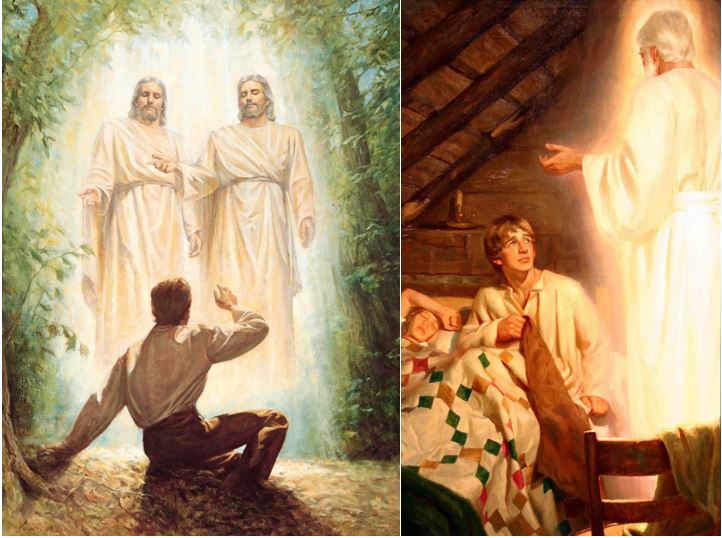
3. Would it be appropriate for us to pray to know our standing before God, as Joseph Smith did? Why or why not?
4. What other principles, applicable in our lives today, do we learn from Moroni’s visit to Joseph Smith?
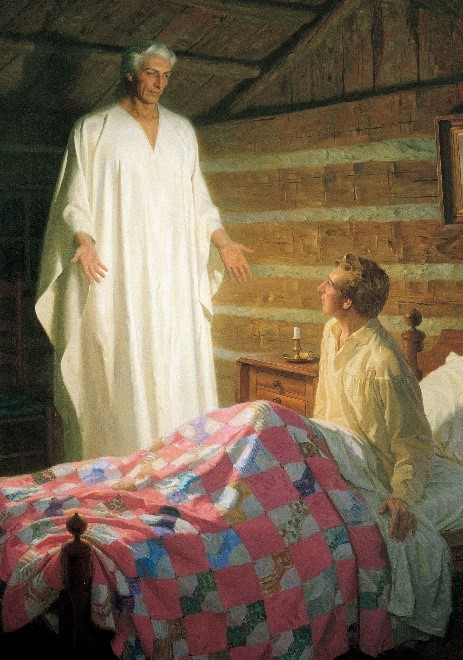
5. What can you say in defense of Joseph Smith’s eloping with Emma Hale, contrary to her parents’ wishes?
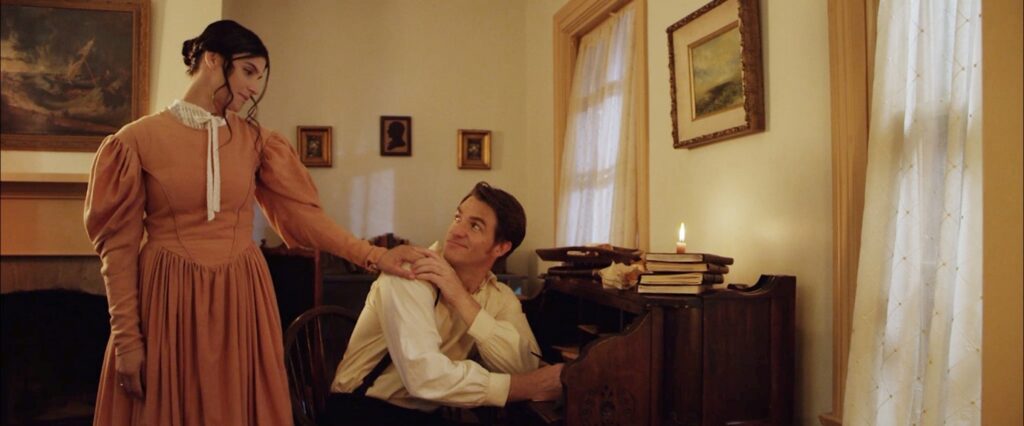
6. If Joseph’s neighbors didn’t believe his stories about visions and gold plates, why did they employ “every stratagem that could be invented” to try to get the plates from him?
7. Martin Harris said that Charles Anthon gave him a certificate to the effect that the characters copied from the Book of Mormon plates were true characters and that the translation of them was correct. Anthon said he did no such thing but warned Harris that someone was trying to deceive him. What evidence do we have as to who was telling the truth?
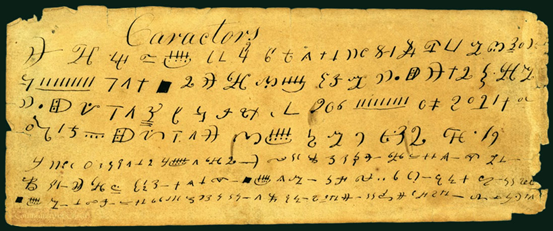
8. D&C 2 has the distinction of being which of the following?
a. The first of all the sections in the Doctrine and Covenants to be received
b. The shortest of all the sections in the D&C
c. The only part of Moroni’s message to Joseph Smith on the night of September 21, 1823, which has been canonized
d. Quoted in all four of our standard works
e. All of the above
9. What do you consider the essential differences between D&C 2 and Malachi 4:5-6, and what importance do they have?
POSSIBLE ANSWERS TO POINTS TO PONDER IN JOSEPH SMITH HISTORY 1:27-65 AND DOCTRINE AND COVENANTS 2
1. Why do you suppose the Lord let three and a half years intervene between Joseph Smith’s First Vision and the visit of Moroni?
Possibilities could include:
- Joseph Smith’s admitted levity and minor “transgressions” during that time
- The need for Joseph to mature spiritually before being entrusted with all that the Restoration would entail.
- The need for Joseph simply to grow physically and get closer to adulthood before it would be feasible for him to undertake the translation of the Book of Mormon, marriage, the organization of a new church, and the onslaught of persecution.
2. What interesting similarities do you see between the circumstances of Joseph Smith’s First Vision and the visitation of Moroni? What were the major differences?
Some similarities:
- Joseph’s major motivation both times seems to have been to learn of his standing before the Lord.
- Both came in response to earnest prayer.
- Both times the heavenly visitors were accompanied by brilliant light.
- Both times the first thing the visitors did was to call Joseph by name
- Joseph was left physically exhausted by both experiences
Some differences
- One was outdoors in the daytime. The other was at night inside the house.
- The visitors in the First Vision obviously outranked the 1823 visitor.
- From Moroni, Joseph for the first time was given an assignment.
- Moroni repeated most of his message at least four times within a 24 hour period.
3. Would it be appropriate for us to pray to know our standing before God, as Joseph Smith did? Why or why not?
It would absolutely be appropriate. In fact, according to Lectures on Faith 6:4-7, we could even say it is essential that we have that assurance. In that lecture, either authored or approved by Joseph Smith, we read:
4 Such was and always will be the situation of the saints of God, that unless they have an actual knowledge that the course that they are pursuing is according to the will of God, they will grow weary in their minds and faint; for such has been and always will be the opposition in the hearts of unbelievers and those that know not God, against the pure and unadulterated religion of heaven, (the only thing which ensures eternal life,) that they will persecute, to the uttermost, all that worship God according to his revelations, receive the truth in the love of it, and submit themselves to be guided and directed by his will, and drive them to such extremities that nothing short of an actual knowledge of their being the favorites of heaven, and of their having embraced that order of things which God has established for the redemption of man, will enable them to exercise that confidence in him necessary for them to overcome the world, and obtain that crown of glory which is laid up for them that fear God.
5 For a man to lay down his all, his character and reputation, his honor and applause, his good name among men, his houses, his lands, his brothers and sisters, his wife and children, and even his own life also, counting all things but filth and dross for the excellency of the knowledge of Jesus Christ, requires more than mere belief, or supposition that he is doing the will of God, but actual knowledge: realizing, that when these sufferings are ended he will enter into eternal rest; and be a partaker of the glory of God.
6 For unless a person does know that he is walking according to the will of God, it would be offering an insult to the dignity of the Creator, were he to say that he would be a partaker of his glory when he should be done with the things of this life. But when he has this knowledge, and most assuredly knows that he is doing the will of God, his confidence can be equally strong that he will be a partaker of the glory of God.
7 Let us here observe, that a religion that does not require the sacrifice of all things, never has power sufficient to produce the faith necessary unto life and salvation; for from the first existence of man, the faith necessary unto the enjoyment of life and salvation never could be obtained without the sacrifice of all earthly things: it was through this sacrifice, and this only, that God has ordained that men should enjoy eternal life; and it is through the medium of the sacrifice of all earthly things, that men do actually know that they are doing the things that are well pleasing in the sight of God. When a man has offered in sacrifice all that he has, for the truth’s sake, not even withholding his life, and believing before God that he has been called to make this sacrifice, because he seeks to do his will, he does know most assuredly, that God does and will accept his sacrifice and offering, and that he has not nor will not seek his face in vain. Under these circumstances, then, he can obtain the faith necessary for him to lay hold on eternal life. (http://www.lecturesonfaith.com/6/)
4. What other principles, applicable in our lives today, do we learn from Moroni’s visit to Joseph Smith?
Your choice. They could include the following:
- We can indeed be forgiven of our sins if we sincerely repent and seek forgiveness.
- We should call others by their names if we want to impress them.
- If we do God’s work, there will be those who will applaud us and others who will ridicule and even oppose us.
- The Lord considers the scriptures important, as Moroni quoted many of them.
- Repetition is important
5. What can you say in defense of Joseph Smith’s eloping with Emma Hale, contrary to her parents’ wishes?
- Joseph and Emma were both old enough to be married, and Joseph was going to need Emma’s help in the initial stages of the translation of the Book of Mormon and in otherwise supporting him in the great work before him.
- It was probably the only way Joseph and Emma were going to be able to do it, as if her father had known of their plans, he would have physically prevented the marriage.
6. If Joseph’s neighbors didn’t believe his stories about visions and gold plates, why did they employ “every stratagem that could be invented” to try to get the plates from him?
Two probabilities:
- Joseph Smith had a reputation as having been a treasure hunter, in part because of his employment with Josiah Stoal, who was looking for an old Spanish silver mine. Many in Joseph’s time and neighborhood believed in the existence of such treasure. They may well not have believed stories about angels, but they may have still felt it quite possible that Joseph had some gold treasure that they had as much right to as he did.
- Satanic forces evidently were also at work, inspiring Joseph’s enemies to try to get the plates from him, and even inspiring them to know of their location, just before Joseph was prompted more than once to move them to a safer place.
7. Martin Harris said that Charles Anthon gave him a certificate to the effect that the characters copied from the Book of Mormon plates were true characters and that the translation of them was correct. Anthon said he did no such thing but warned Harris that someone was trying to deceive him. What evidence do we have as to who was telling the truth?
Harris came back from his visit with Anthon convinced that the Book of Mormon was a true and divine record. He ended up selling part of his farm to pay for its publication. Anthon, on the other hand, obviously felt he had a reputation to protect and was quite willing to lie about the encounter once he learned that angels were involved. Anthon, of course, couldn’t know whether the preliminary translation was correct or not, as no one on earth could read that language without divine assistance. But as one of the foremost linguistic scholars of his day, the professor couldn’t admit that someone else was possibly reading something he could not.
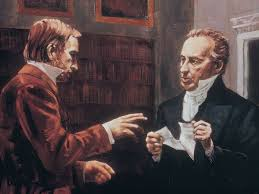
8. D&C 2 has the distinction of being which of the following
a. The first of all the sections in the Doctrine and Covenants to be received
b. The shortest of all the sections in the D&C [Almost but not quite]
c. The only part of Moroni’s message to Joseph Smith on the night of September 21, 1823, which has been canonized [Joseph Smith History 1:27-65 certainly is canonized scripture.]
d. Quoted in all four of our standard works [No, though it is quoted in two and a similar version is found in a third—the Old Testament.]
e. All of the above [No]
9. What do you consider the essential differences between D&C 2 and Malachi 4:5-6, and what importance do they have?
Possible answers could include:
- D&C 2 emphasizes the importance of the priesthood, suggesting that Malachi was not simply foretelling a future interest in family history but the performance of essential temple ordinances.
- D&C 2 refers to promises made to the fathers, without defining who these fathers were nor of what the promises consisted. Possibilities could include:Promises were made to Abraham, Isaac, Jacob, and ancient Israel in general that they were to be God’s covenant people and were to carry God’s message and the blessings of the priesthood to all nations. Furthermore, all who accepted the gospel thereafter were to be counted as part of their posterity. (Abraham 2:9-10.) Malachi could be referring in part to an awakening in latter-day Israel to their divine heritage and responsibility.The Lord and/or we ourselves may have made promises to our ancestors in the premortal life that we would seek out their data and have temple worked performed on their behalf.
- Without the priesthood keys to be restored by Elijah, the earth would not simply be smitten “with a curse,” but would be “utterly wasted.” This had to have weighed heavily on young Joseph’s mind as he learned for the first time something of the magnitude of what the Lord was expecting of him.

